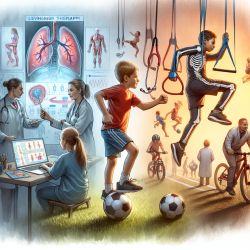As therapists, especially those of us working in educational settings, we're always on the lookout for ways to enhance our skills and broaden our professional horizons. The insights from Jane R. Madell, PhD, in her extensive career and contributions to the fields of speech-language pathology and audiology, provide valuable guidance for practitioners aiming to elevate their practice and impact. Here, we delve into how implementing outcomes from her research and experiences can significantly benefit our therapy sessions and encourage further professional development.
Madell's primary interests in pediatric audiology and aural habilitation for hearing-impaired children, alongside her pioneering work in hearing aid dispensing, have led to substantial advancements in how deaf and hard-of-hearing children maximize their residual hearing. These areas, ripe with research and development, suggest that practitioners can significantly enhance their therapy outcomes by focusing on:
- Specialization and Continuing Education: Madell's focus on pediatric audiology and aural habilitation highlights the importance of specialization. By pursuing further education and certifications in specific areas, therapists can deepen their expertise and offer more targeted interventions. Online courses, webinars, and workshops provided by reputable organizations can be excellent resources.
- Innovative Practices in Hearing Aid Dispensing: The evolution of hearing aid technology and its dispensing process offers a realm of possibilities for improving patient care. Staying abreast of the latest technological advancements and incorporating them into practice can significantly enhance the quality of life for individuals with hearing impairments.
- Collaboration and Networking: Madell's work, particularly in establishing standards and ethics within the profession, underscores the value of collaboration and networking. Engaging with professional associations, attending conferences, and participating in forums can provide insights into best practices and emerging trends, fostering a community of learning and support.
- Advocacy and Ethical Standards: Madell's tenure as ASHA Vice President for Standards and Ethics brought to light several crucial issues, including the certification status of internationally trained professionals. Advocating for equitable standards and supporting initiatives that facilitate the professional integration of therapists trained abroad can enrich the therapy community and enhance service delivery.
- Accreditation and Certification: Encouraging and supporting programs to seek accreditation and clinicians to obtain certification can elevate the profession's standards. This pursuit not only benefits the therapist's professional development but also assures clients and communities of the quality and reliability of the services provided.
Moreover, Madell's emphasis on the need for the profession to market itself effectively, attract highly qualified students, and continue encouraging research adds another layer of responsibility for current practitioners. By actively participating in these areas, therapists can contribute to the growth and recognition of the profession:
- Marketing the Profession: By clearly articulating the value and impact of speech-language pathology and audiology services to the public and other healthcare professionals, therapists can enhance the profession's visibility and recognition. This can be achieved through community outreach, social media, and collaboration with educational institutions.
- Attracting Talent: Engaging with students and young professionals about the rewards and challenges of a career in therapy can help attract passionate individuals to the field. Offering mentorship, internships, and shadowing opportunities can provide valuable exposure and inspire the next generation of therapists.
- Supporting Research: Staying informed about the latest research, participating in studies, or even conducting independent research can contribute to the profession's body of knowledge. Sharing findings through publications, presentations, and professional networks can foster a culture of innovation and evidence-based practice.
Madell's optimistic view of the profession's future, despite the challenges, serves as a reminder of the potential for success and impact we have as therapists. By embracing specialization, engaging in lifelong learning, and actively participating in the broader professional community, we can continue to make significant strides in supporting the communicatively handicapped.
In closing, Madell's work and dedication to the field of speech-language pathology and audiology offer a wealth of knowledge and inspiration for therapists eager to advance their skills and make a lasting impact. By implementing the insights gleaned from her research and professional journey, we can continue to evolve and enhance the quality of care provided to our clients.
To explore more about Madell's contributions and insights, An Interview with Jane R. Madell, PhD provides a comprehensive overview of her work and its implications for the field.










